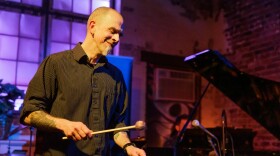One of the hottest young modern jazz musicians in Hawaii, multi-instrumentalist and producer Dae Han has traveled a unique path to his musical career. Based on the island of Oahu, he's a proud member of a very musical local community and Honolulu's Aloha Got Soul record label.
New Cool host Abe Beeson connected with Han to talk about his debut album, his family's intervention after he became addicted to opiates, and the rich but underappreciated tradition of modern Hawaiian music.
Dae Han grew up in Maryland, east of Washington, D.C., where his first musical instruction was focused on drums and mallet percussion. By the end of high school, Han started digging into laptop production and beat making. Han said he often felt out of place as a Korean kid in Maryland, but found a musical identity in drumming and the funky rhythms of the D.C. go-go scene.
His older brother is a professional musician and first exposed him to jazz at the Blue Nile in Minnesota. Han said the night impacted him immensely, particularly the drumming of Carlos Boyce.
"He played very softly, yet so dynamically. I didn't understand how he was doing it, but I was entranced by it. It would only begin to make sense and manifest in my own playing much later in life," Han said.
After school, Han moved to New York City. He said it was exciting but he struggled on a low income and became addicted to opiates. Three years later, he hit bottom. Han attempted suicide by overdosing but said, "God had other plans for me. My family intervened and decided that moving to Hawaii to live with my sister was the best course of action."
Arriving in Honolulu, Han explained he "instantly realized how ignorant I was of life on the islands. I was completely floored to see the thriving jazz scene in Honolulu, and I made it a goal to get in the scene as soon as I could."
"Music is clearly an integral part of the culture here on the islands. Everyone here either plays an instrument or sings, and these dudes can really play! Most kids learn ukulele in elementary school and to me, that's way cooler than learning recorder in Maryland." he continued.
The 2020 album "Blue" is the story of Han's journey, a project five years in the making and musically inspired by the soundtrack of his life: Stevie Wonder, J Dilla, and Miles Davis. Also influential are Han's frequent collaborations with popular Japanese hip-hop star Shing02, who's featured on "DC2NYC2" along with turntablist SPIN MASTER A-1 and Honolulu soul singer Maryanne Ito.
Han points to numerous "life events that inspired the songs on this album, but the most impactful were the seasons of depression and self-reflection. When you hear the word 'blue', unless it's being used to describe the color of something, it implies sadness."
One of first songs written in Hawaii was "Honolulu Jazz", which Han says evolved gradually over time. "I wanted to take extra considerations to honor the jazz musicians of Hawaii, so when we tracked each instrument in the studio, we took our time with it and tried to make every note of the song meaningful," Han related.
Also crucial to Han and the greater Honolulu music community is record label Aloha Got Soul. Started as a blog to document Hawaiian records that had been overlooked or forgotten, it's now a hub for musicians, artists and stories to live on, championing new music and rare reissues from Hawaii.
Label owner Roger Bong told me Han sent "an early demo for me to check out and although I liked it, I knew to give him and his partner, Nelson Cho, more time to finish it. I offered to help him out by releasing "Blue" on the label. The music has continued to attract new listeners and just last month we sold out of all the vinyl copies we pressed! That's always a great feeling."
Aloha Got Soul is dedicated to preserving Hawaiian music "for posterity" Bong told me. "We believe in learning from the past to inform the present so that we can better shape our future."
Many of their most popular releases are reissued hard-to-find albums by '70s and '80s Hawaiian Renaissance artists like Eddie Suzuki, Kalapana, Mike Lundy and the bossa nova-inspired duo Steve & Teresa.
The Aloha Got Soul label committed itself to exploring every corner of Hawaii for the best music, regardless of genre or generation. First focusing on '70s and '80s jazz, funk, soul and R&B music, they've grown to support the artists working today.
The Hawaiian Islands, Bong said, "are a 'mix plate' of identities and ethnicities. There are so many different kinds of people who call Hawaii home, and while we aren't all 'native Hawaiian', all of us are the fabric that makes a modern Hawaii."
Han is joined on the label by a new generation of modern island musicians. Check out a varied collection of progressive styles from Nicadrio Lee, FRNT BZNZZ, Jah Gumby and more through Aloha Got Soul. Next time you're in Honolulu, stop by their store and tell them you heard it on The New Cool.
If you or someone you know may be considering suicide, contact the National Suicide Prevention Lifeline at 1-800-273-8255 (En Español: 1-888-628-9454; Deaf and Hard of Hearing: 1-800-799-4889) or the Crisis Text Line by texting HOME to 741741.
The New Cool airs Fridays at 9 p.m., hosted by Abe Beeson and produced by KNKX Public Radio in Seattle, Wash.








